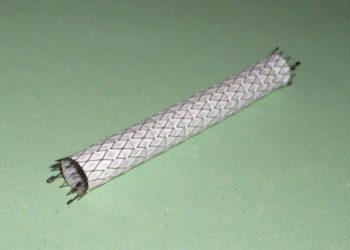Extended dual antiplatelet therapy after DES reduces risk of thrombosis [DAPT trial]
1. After 12 months of dual antiplatelet therapy, patients who continued on a thienopyridine in addition to aspirin for 18 months experienced significantly lower rates of stent thrombosis and myocardial infarction compared to those taking placebo.
2. The risk of bleeding was significantly higher in patients who continued on thienopyridine therapy.
Evidence Rating Level: 1 (Excellent)
Study Rundown: Coronary revascularization with drug-eluting stents (DES) is increasingly used to treat ischemic heart disease. While DES reduce the risk of restenosis compared to bare metal stents (BMS), they are associated with a higher risk of stent thrombosis, which may result in myocardial infarction and death. After stenting, patients are treated with dual antiplatelet therapy in order to prevent progressive atherosclerosis of the stent itself and potential subsequent plaque rupture. The optimal duration of dual antiplatelet therapy to reduce the risk of stent thrombosis and atherosclerosis, while considering the increased risk of bleeding, is unknown. The purpose of the Dual Antiplatelet Therapy (DAPT) trial was to explore the effects of continuing dual antiplatelet therapy with a thienopyridine and aspirin for an additional 18 months in patients who had already been treated for 12 months.
In summary, the risks of stent thrombosis and myocardial infarction were significantly reduced in the group continuing dual antiplatelet therapy, compared to those being treated with placebo and aspirin. Patients continuing on dual antiplatelet therapy, however, also experienced significantly higher rates of bleeding. A major limitation of this study is that patients were only eligible for randomization if they were adherent with therapy and did not experience any cardiovascular or cerebrovascular events in the initial 12-month treatment period. As a result, patients who were randomized may be at lower risk of adverse events compared to the general population, thereby limiting generalizability. Notably, the study was funded by eight companies that manufacture stents and pharmaceuticals.
Click to read the study in NEJM
Click to read an accompanying editorial in NEJM
Relevant Reading: Extended duration dual antiplatelet therapy and mortality: A systematic review and meta-analysis
In-Depth [randomized controlled trial]: A total of 9,961 patients from 452 sites in 11 countries were randomized as part of this study. Patients were eligible for the trial if they were >18 years of age and could be treated with dual antiplatelet therapy after receiving DES (i.e., sirolimus-, zotarolimus-, paclitaxel-, or everolimus-eluting stents) or BMS. In this trial, only patients receiving DES were analyzed. All eligible patients were treated with a thienopyridine (i.e., clopidogrel 75 mg daily or prasugrel 10 mg daily) and aspirin for 12 months. Afterwards, patients who did not experience a major adverse cardiovascular or cerebrovascular event were randomized to continue treatment with a thienopyridine or a placebo until the 30-month mark, in addition to daily aspirin. The primary endpoints were the cumulative incidence of stent thrombosis and major adverse cardiovascular and cerebrovascular events (i.e., composite of death, myocardial infarction, and stroke) between months 12 and 30. The primary safety endpoint was the incidence of moderate or severe bleeding. Eight stent and pharmaceutical manufacturers were responsible for funding the study, though they did not have the right to make changes to the manuscript.
Patients who continued thienopyridine therapy experienced significantly lower rates of stent thrombosis when compared to those on placebo (HR 0.29; 95%CI 0.17-0.48). Moreover, the rate of major adverse cardiovascular and cerebrovascular events was also significantly lower in the thienopyridine group (HR 0.71; 95%CI 0.59-0.85). This was driven by a significant lower rate of myocardial infarction in the thienopyridine group (HR 0.47; 95%CI 0.37-0.61), as the rates of death from cardiovascular causes and stroke were similar in the two groups. With regards to safety, the risk of bleeding was significantly higher in the group that continued thienopyridine therapy as compared to placebo (HR 1.61; 95%CI 1.21-2.16). Notably, these differences were consistent regardless of the type of stent or thienopyridine used.
Image: PD
©2014 2 Minute Medicine, Inc. All rights reserved. No works may be reproduced without expressed written consent from 2 Minute Medicine, Inc. No article should be construed as medical advice and is not intended as such by the authors, editors, staff or by 2 Minute Medicine, Inc.







